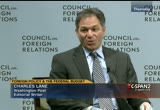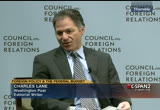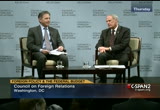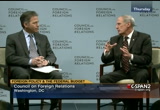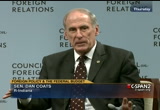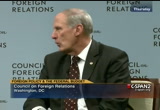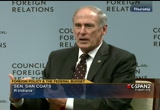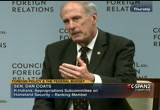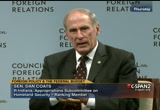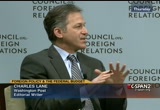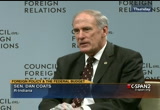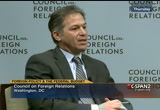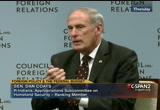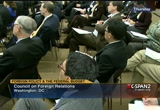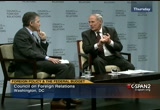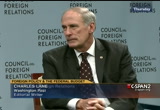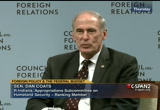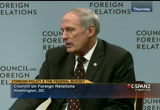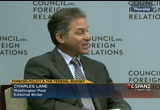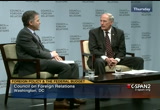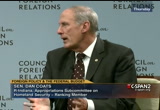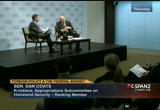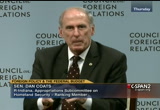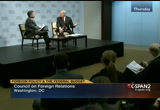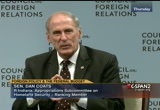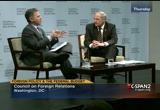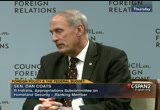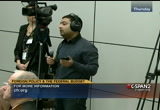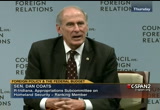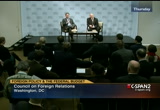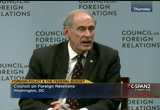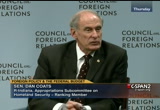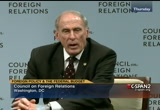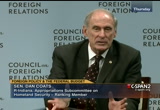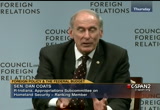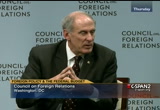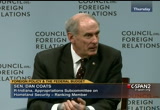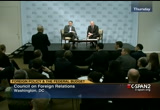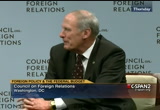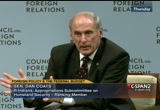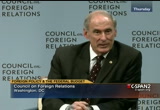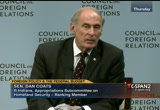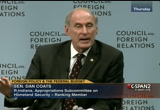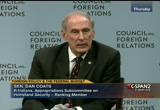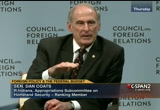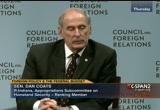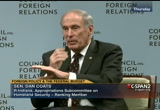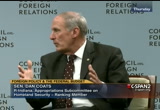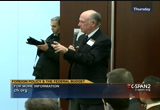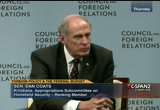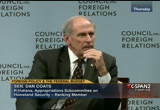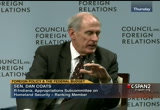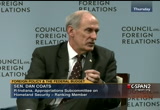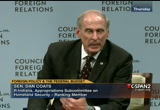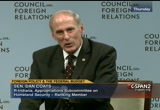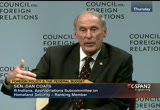tv Public Affairs CSPAN January 25, 2013 7:00pm-8:00pm EST
7:00 pm
discussing. just a few points of business i have to go through before we start. you have to completely turn off, not just put it on vibrate, all those doodads like cell phones and blackberries, otherwise to the inner earth sciences and then you would want to miss a word i'm going to say. if you would like to use an ipaq time you can do it outside. i guess the folks outside the direct you to an overflow room where you can see a live feed, so you don't have to worry about that. in contrast to some other meanings in the past, this one's on the record. so don't work something out that she don't really mean for you can't defend later on because it can be used against you.
7:01 pm
with that, let's bookmark as, senator dan coats who doesn't need much of an introduction. obviously somebody you all know, not just because of his role in the senate and appropriations committee and involvement with issues of foreign aid they are, but also in his previous 10 tarnation as u.s. ambassador to germany during the first half of the last decade in which there were a few interesting matters like iraq and so forth. senator coats obviously if you're interested in trans-atlantic relationships as a result of that experience is he's had. and his concerns to budgetary
7:02 pm
pressures and other pressures facing the united states and its role. senator, thanks a lot. i know it's not easy for you to get here and that's not either. i guess that they too began and a general way asking you, what is the concern? what's worrying you about the possible interaction between limited resources here, pressure to cut the budget and what that might do in terms of limiting u.s. role abroad? >> the consequences of a diminishing pool of resources available and all the fiscal pressures on the congress now in terms of the decisions they make and how to allocate on and the prospects for the future not looking on that.
7:03 pm
combined with i think it less and less engagement, knowledge of and participation by members of congress and global affairs, whether it is national security, military related or whether it's foreign policy aide related for diplomacy and our presence throughout the world. if you let back -- look back to congress 20, 25 years ago, is essentially made up of people who have the relationship to world war ii and its aftermath in terms of the u.s. global engagement. the marshall plan and the rebuilding of japan in america's prisons. in the relationship also in the
7:04 pm
lessons and threat posed by the cold war. and those were very defining, major umbrella issues that produced great statesman. henry jackson and others on a bipartisan bill and water's edge, america's presence and engagement around the world. two superpowers, the umbrella that was held over the world stifled the regional and local factions and tensions that erupted after the end of the cold war. that all had a significant impact on the american people and commitment and support for the u.s. to be at bobo -- be globally engaged. it is the possibility of a five
7:05 pm
alarm fire and everybody's been to try to keep them from getting out of control. with the fall of the wall in the aftermath, there was the defining event and that was iraq's incursion into kuwait. we saw the global presidents put together by jim baker and george h.w. bush nsx 70 hageman of the world's nations. this subset can do that, we have seen a completely different scene and that is what i would describe as the 20 armors and three libraries and they've got about a dozen fires popping up here in different parts of the world. and oliver sudden, you have people who don't have -- a lot of people in congress who don't have the previous reference has basically come to the conclusion that the world is change and
7:06 pm
they really can't afford, nor do we have the public support for global engagement. when you go back home intact to people back home, it literally is like saying you need to diet and lose a lot of weight and i'll get a haircut or not solve the problem. the amount of foreign aid in person is shrinking to the point where it's relatively insignificant compared to the whole. yet the will to support that going forward into the event step out and say well, we are to be more engaged here or we can do more here or these are the functions that are working, it's hard to get public support for that. it's hard to get congressional
7:07 pm
support. the yoshio -- what are the consequences of a diminishing public support pretty well articulated by the president, both in its campaign in postcampaign announcements. we're not going to be everywhere in fact, we're going to retract. the support of the american people basically saying why we bear? so whether it's maintaining forces are presence in germany to be a staging point for all that's happening in the middle east, whether it's engaged in syria are not engaging in theory a relating from behind on libya, the pacific have it, you know, it's more like i had faith. how do we begin to have the resources to address those rising rates in the future.
7:08 pm
all of that is something that needs to be carefully looked at and talked through and be realistic about the fact that it will not be engaged in a global basis in the current fiscal situation given the current political will the american people. >> obviously there's an interaction between the resources we have available and political will. obviously if we had infinite political will at times resources, and maybe vice versa. even some of the speeches he made recently calculated that nato and the fact that the experience in afghanistan is not over yet, but hasn't been a terrifically happy one for nato and not might serve as lead to a
7:09 pm
which we just don't have the will anymore, the intention to stay on the same scale before, particularly the exception that her partners are are now pulling away. how do you think will really keep nato going? to sustain nato and keep it relevant given her budgetary restrictions? >> in intervening event poses a threat. we thought a little research and said nato the libya situation, where clearly the united states is not going to take the lead, was going to supply reconnaissance, intelligence, surveillance and a little bit of backup. either nato getting together going forward are not. the threat of you stabilize
7:10 pm
libya, consequences of that for southern europe, the history with european presence they are as a precipitating event. but i think it's going to take something similar to that, one issue that potentially could be that is the whole situation of their weapons things in the fact that europe would be easily within the gunsight would be a significant consequence for those nations closest to the middle east with a nuclear armed iran. >> that's a bit on the security side. you alluded to the development side they kind of want everything together, but when you talk about the demented mass quantity of the budget devoted to a common message you have in mind as to development
7:11 pm
assistance for that is always a vulnerable part of the budget. i see during the early campaign the only program will cut rates foreign aid. tell us your view about how we can put that on a sustainable basis politically. how can you persuade the public is being used efficiently? what is working and what is not? >> the key word is sufficiently. we have to demonstrate that the money that is taxpayer money being spent on trent sent overseas is number one in our strategic national interests. we have to articulate what that interest is. secondly, we have to go beyond sending the money so it gets deposited into a belief that countries this bank account. do we have to demonstrate the money is perfect for use to redress certain things.
7:12 pm
give george w. bush significant for pat fire and out for, because they have set a set of standards that these are values. if you are able to enforce -- implements and enforces standards, we will provide you the support and there's some very good success stories. this is a typical climate with which to go back home and tell people this is something that works and is in our national interest. we have a moral commitment on tragic things happening in disease and so forth. as we see with happening now in africa, particularly on the threats they are and changes
7:13 pm
taking place. i know general walters here. i've got my acronyms mixed at. he was deputy to jim jones and spent a lot of time looking at africa from the standpoint of his position in europe, kind of foreshadowing what was to calm and pleading for engagement in presidents in dealing with what was happening there. now we see some of the consequences of that plane out. so this guy to make the case to the american people. we've got to show we are effectively spending money for the right reasons and international interests. there is an underlying moral commitment to address some of
7:14 pm
these major nutrition all disease related problems in doing so america's presence is a positive, not in a few days. >> you now, there's a whole other issue facing now because of the backlash against the united states in a country like pakistan and each at, which are large recipients of the public majority that is military, but there is a very powerful sentiment that this evil don't like us. they take our money and burn our flag. luscious cut them off. obviously there's been resolutions and so forth. talk about how you respond to you think the country how to respond to that very powerful sentiment.
7:15 pm
>> well, the common thread here is the presence of al qaeda and its affiliates in the threat that poses to the world from the standpoint of stability and peaceful transition of government. we are reminded that almost every day and it's a crested that sweeps across the middle of the world, starting in indignation at coming across northern africa and now moving down to the sub-saharan parts of africa. this is a threat that has enormous implications. we've seen ignoring the threat as we did in afghanistan pre-9/11 leads to dire consequences potentially for americans. it is true the american public is more weary, but nevertheless we are reminded every day that
7:16 pm
works and journalists -- >> i want to get that mentioned a manner. for a living in a of world. it's hard to define where this thread is because it pops up everywhere. it's like whack a mole. he whack iraq and they do you think in and you're back in afghanistan and do that and all the sudden were in libya and algeria and things are happening that pose real threats, particularly at a time when the possibility of the combination of a weapon of mass destruction and terrorist and can result in an attack on american presence, whether it's there or whether it's here. that is a grave threat that we have to keep reminding the american people that we are only one attack a way for weapons of
7:17 pm
mass distraction to the total destruction of major u.s. city. we don't want to have to reengage our thinking and how we use our forces and diplomacy to address these kinds of things in another post 9/11 scenario. >> doing it ahead of time, without thinking a while, i'm not quite real to do that unless there's another defining event that may have horrible consequences. >> i guess part of what you're saying is they may be a sense that when we spend a lot of money to a country that we should be entitled to loyalty and control in some kind of client like status. >> it would be nice if they said thank you.
7:18 pm
>> but i guess what you're saying is in a way the money we send in a place that pakistan or egypt is remaining a player there. the price of being in the game in those countries. >> the mistake though it's not holding those countries accountable to how that money is utilized and making a transparent bag to the american people and congress being effectively monitored and used in meets preconditions standards before we spend that money. that's got to make a case to the american people or they're not going to continue to support. >> distortive specter of corruption and so forth is always hung over foreign-made. i think we've been saying in different ways, what is new is again the public sense that were
7:19 pm
being cut to ask here. a phrase you often hear and i've heard we need to start nationbuilding a home. i casually informed that pose extremely well, that line. you're not only a foreign-policy thinker, but a politician. but politically it's the effect is counter to that? >> well, we have to acknowledge that we have the blood of nation noting to do here at home and that needs to be the priority. that reality is going to affect the kind of resources that will have available to do the kind of global engagement, global
7:20 pm
diplomacy that we've seen in the past. i think we are severely resource constrained and politically constrained them are going to have to prioritize and really make the case for whatever expenditures go out relative to military presence and span interstate diplomacy and foreign aid spending. that is the reality we have to deal with and i believe we will be forced to make some hard choices in that regard. secondly, i would just simply say, as i say to virtually every interest group that comes into my office, here's the line. we know that resources are tight. we know we have to cut back, but
7:21 pm
our program is different from everybody else's and that's universal. rather than argue with them, they simply say i'm not sure to argue as to whether your program deserves priority over the last group. so whether it's bridges and roads, medical research, education or any number of other things that fall in the discretionary category to the defense spending. i simply say unless they have to come to the realization that unless we can address our mandatory spending, which is running away with the budget and ever shrinking ability to make decisions about how we as discretionary spending, and left to get control of that, everybody will fall short of what they want. so i'm not debating whether more money should go into medical research versus building bridges
7:22 pm
for infrastructure or whatever. i'm simply saying all of that is squeezed and therefore asking you to support your senator or senators or representatives in giving them the back don't encourage to stand up and say we have to address this for everybody loses. and that is the message of the day and now we have no election over that issue. for having a debate in congress every day over that issue. to this point, the president has not indicated postelection that he thought that it used about addressing the mandatory spending issue. and we can't get there until he dies dies because without his leadership the matter what congress called both together in this regard it's not going to go forward. that to me is the challenge of
7:23 pm
the day and that has a very significant play on our national security, our ability to fund our military so they can engage where we needed to engage. we can't solve everything through drones. that has major implications on diplomacy and for nato to take other because it's right on the priority list and so that is the overarching issue. i say absent an intervening event like we had a 9/11, shaw priority became number one and everybody rallied around. trust me, we don't want that to be the reason, the impetus for change in our policy. we want to do everything we can possibly do to keep that intervening event from happening to cause us to be or is
7:24 pm
thinking. >> i got the idea for the lobby. all the groups that depend on the discretionary budget together in one giant lobby to gang up on medicare in that way they can save the money for the wrong things. >> coalition of the discretionary. and marches down to the capital. tens of thousands of people say wait a minute. you're eating our lunch. >> i'm going to go out. i can see them going out. >> just to wrap this up before we go to question, give us a preview. obviously the right the middle of a huge debate that's going to get even huger. give us your best sense of how these accounts were discussing
7:25 pm
are going to scare the next two to three months. >> not well. sequesters living. he saw the house yesterday to a tactical position of taking the debt limit off the table for three months or so. but the focus now will be on the sequester and those have been saying ever since the budget control act that we never can let this happen, particularly on the defense side are going to see enormous pressure to that happen. we cannot come up with a grand bargain. there's not been in play right now it looks like the white house will accept on a grand bargain and the sequester and the resolution of the budget
7:26 pm
that comes in march. those two are going to have some out and spending attacks to it in my opinion and it makes it more difficult than it rdas. >> thanks for your comments and now is the time. the gentleman with the camera is waving. i just want to know if i'm doing the right inherent. >> i am with you a tv national. my service -- my question is how do you think they may affect afghanistan and development the guns in 2014?
7:27 pm
>> with our design decisions made relative to presence in afghanistan and they certainly don't serve currently in the foreign relations committee and i'm certainly not as up to speed as people in this room relative to the assessment of what that might. but we get conflict and reports relative to how successful this current government in afghanistan can be without the significant american presence. we see is difficult enough that the small contingency pretty much inside the perimeter and continue to see a lot of factions fighting in afghanistan looks to be about a 10 fold
7:28 pm
magnitude of what potentially could have been with the u.s. reduction in presence. i've always said afghanistan is really about pakistan. and the instability they are the picture that's being painted here is a significantly less presence of u.s. involvement in that region because the consequences that come from not. >> i should've said when we need to ask your questions, ask them with the mic and stan identify yourself and keep your questions short. it was time, back to you. yes, sir, right here. please identify yourself.
7:29 pm
>> jack james from the american institute for german studies. i want to ask you about europe and whether or not you think there is enough support coming from europe to deal with those issues. we talked about germany as you well know and britain going in and out in afghanistan. the french are in mali. there's been criticism about holding that. you just mentioned constraints. is it not the case we had to not only expect if we can get it, europe could be helpful in areas that they cannot necessarily have have a large footprint in. you know europe as well as i do in that? is do you expect that is something we can see more of in the future as a face their own constraints at home. >> the constraints are even greater than ours in the public will to engage in not is even less than ours.
7:30 pm
that's why a lot of questions are raised here by members of congress, basically saying why are we still in germany? we have all this infrastructure and so forth and so on. can we bring us home. and how much do they step up what we really need them that they don't look for the europe umbrella over nato -- the u.s. umbrella over nato and there's some defining moments relative to the future of nato and the trans-atlantic relationship in dealing with this whole range of issues going all across south of europe that's going to have a direct effect on them. i wish i could be more optimistic about a, but we all see what the fiscal constraints
7:31 pm
are and the affaires d. been imposed and they will literally come to the point where they have tough decisions to make because the u.s. will simply not be there at the level in presence and protection that they're used to and have relied on in the past. >> bud mcfarland, husband. >> that, your legacy lives on. good to see you. >> thank you for coming. for more than 30 years they served our country. during the energy natural resources committee a though. we are continuing to spend almost $400 billion a year to buy oil. and your colleague, senator lugar for a long time has told us the only way to beat a cartel
7:32 pm
is through competition and is sponsored and open feel standard to make a competitive market to move automobiles of drugs, whether it's not banal or whatever to have a market so when you drive a to the pump you have a choice in the price goes down. what do you think? do you think that's a good idea? at your colleague on, he saw stuart country. with a competitive way to break the opec cartel? >> the technology developments and fracturing has become that competitive instrument that is
7:33 pm
causing that to happen. we had the great fortune of this technology that is going to put this in a completely different position than in the past. i don't think we need to -- we see me after to develop the sources of energy. they can't be competitive because of the new discoveries of oil and gas through shale that is a total game changer will put us in position where we are going to be a country in the world but perhaps the most competitive and lowest price for energy of anyone. just talking about germany puts us in a terrible position.
7:34 pm
former chancellor may cut a deal at the end of his service there is chance there with the russian and a locked in 20 or supply of gas from russia at a price that's about four times the world market right now. at the same time, germans have taken the position of shutting down all of their nuclear plant. huge subsidies for wind and solar. the problem as the sun doesn't shine very much in germany as chuck well does and the wind doesn't blow in a lot of places and is heavily subsidized. so i think there's been a keen changer here it is exciting for the future of america. if we can get our fiscal act together, we have some very breakers ahead of us in terms of
7:35 pm
returning to economic world leadership in this breakthrough technology is just amazing. >> wonderful staff who left and went on to do great things. >> senator, i'm wondering if you could discuss from your perspective of the appropriations committee. candidates will figure out how to pass those and impacting the policy is going to be far more intricate and difficult to do as defense expenditures come down whether foreign policy and those types of appropriations for the state department increase or change much. the load will increase significantly. how do you see the congressional committees collaborating more effectively and working with the administration to not only set this budget figures, but help
7:36 pm
influence the policy? >> the first challenge is to let the committee be a committee. by serving the appropriations committee, it is all for naught if we don't have regular order, which starts at the budget, which now inherently we are told were going to get finally in the senate this year one way or another and then starts at the regular process given whatever calf it for us is asked which we should have been doing all along of what are essential function that need to be funded and how do we find the resources to fund those clicks how do we separate that from the lake to do, but can't afford to do right now and
7:37 pm
how to separate those produced no longer are viable, haven't proven their worth. should be transferred by the sheer. it's a triage process that is not taken place in the past, but the budget constraints are forcing us to make those kinds of decisions and that is because the type is shrinking on discretionary and without that change, this is a will have a direct effect on policy and how many ships we can build, where we want to be locating our troops. it's more of a head fake puma going to pay 600 marines on a six-month rotation of base this and they're going to be there looking nor to china, indonesia
7:38 pm
was 600 marines. that is a shift. how many carriers can they put that are cutting down on the numbers we are going to build in everything that's happening. on and on it goes. so we're going have to make tough decisions on priorities. the toughest decision that hasn't been made and must be made or were all looking austerity and doing much, much less do i need to be doing as they were speaking nations and that is getting control of our runaway mandatory spending that is just leaving all of us asked her to position them in the long run really hurt america. >> rate here. >> allen went. senator, who served as ambassador to germany. could you comment on germany's role in the world today.
7:39 pm
arguably given their financial and economic strength, could they be doing a lot more, even in the military sphere? the second world were 70 years behind us. could you give us your view on germany's role today? >> i could. there's somewhat of a myth that are about this german economic machine. compared to the rest of europe, it looks terrific. when you look at gdp growth, 0.4%, they get to 1% and call it a holiday that celebrates. >> we did enjoy the holidays of the affair. >> it's really a wonderful place to serve because you can sit in a café and drink coffee and talk. germans love to talk you are talking about whatever problem there is, let's have some dialogue about that.
7:40 pm
so germany isn't in the position that projects itself to be. i think it has a reputation and obviously producing magnificent machines and cards and the germans do that, they do it right. but with some failing economies are weak economies that heavily depend on exports, heavily dependent on the car industry. david notes that can go up and down. and so, two things. i don't think they have the political will to engage much outside the borders. and i don't think they have the financial resources to do is manage as we think they should do and maybe even some policy people think they should do relative to their military strength. if salaries were just not in a position to do that now there's
7:41 pm
been a heavy reliance on u.s. president says that diminishes the tough decisions to make as are other nations. yes, ma'am, her. >> of learning. barbara mathews of bcm analytical as. i've got a question about the 21st century with large. you have described what sounds like you consider to be as inevitable retrenchment if not a potential return to some isolationists in the united states whether for political reasons or budgetary constraint purposes. that is a very different position than america as a guarantor of security and liberty locally. europe may not have the financial resources to take up at the time. could you describe what you think the risks are to the
7:42 pm
united states and not certain as the leading nation visit to a common military, particularly in the context of so much to miss them being placed on soft power, trade relationships and trade agreements and economic power as the postmodern way of guaranteeing security? >> the consequences are potentially very significant. america has always looked to, since the end of world war ii as a nation that paves the way. much like we used to look at california as the future for the other 49 states. they're always the lead. we look at california and save the basket case. i think a lot of the world is looking at america today and basically saying they're not the power they once were.
7:43 pm
for the resources to be there. more carefully than the american public was. relative to our national security and engagement in the future. they look at the congress and fiscal situation and say america is not what it once was. it frees up the ball to do things that are not in our best interest. they don't have the constraint of this thread of americans presence and influence and even engagement to restrain them. they were severely underresourced and africa. trying to make up for piii
7:44 pm
surveillance collection and transit we can get them there. and yet there's this growing presence of radical islamic extremism now growing in that part of the world. and so, i think the consequences are very great, which is why i'd be a tad drum here. i keep going but that a dynamic economy will have to be seriously to be that nation of the world can look still i started the overseer of tension in a nation that you can turn to to help resolve some of those tensions. we have a type battery and yet.
7:45 pm
iran's continued movement to his possession of nuclear weapons capability is a game changer for the whole middle east proliferation of other nations pursuing not. i cannot foresee how saudi arabia, turkey, and maybe even aged can say we are going to let iran be that nuclear power and the leverage they would gain from all of that. maybe not right now -- that used to be the high-profile issue. you don't read much about it anymore, but the clock is ticking in tehran toward nuclear capability. some verbiage over here about my sanction and diplomacy and so forth, but no response the other
7:46 pm
way from the leaders in iran. other questions? yes, sir, in the back. >> senator steve cheney with american security project. these do you talk about weapons of mass destruction come of it that your thoughts on weapons of mass destruction. under new state the caps at 1550 but thousands were in reserve, is there not an opportunity here to look at the triad, significant reductions, perhaps look again at the start and not building new bomber. >> that will be part of the debate. we have to decide at what level do we need to be from the national security military standpoint to protect the american people and to be seen as the capability to do that.
7:47 pm
i think the larger question is that we need to focus on rather than reduction is what's happening around the world. what's happening in the korea and what's happening in iran and what kind of access are some of these groups going to have two wmd capabilities? that's the greater threat. i do give senator lugar and senator nunn great credit for being part of reducing -- destroying some of those older weapons and so forth and so on. the real challenges those nations totally ignoring the non-proliferation treaty and doing everything they can to move towards that capacity. >> senator, if i could exercise a privilege and follow-up. part of what i'm getting at is
7:48 pm
we need to come within the national security budget for defense budget, we need to make are your deeds. the sequester seems to be this broad across-the-board. could you give us specifically as you deem appropriate a sense of what that is going to do to the defense budget? >> you see what leon panetta has said. you see the dire warnings coming out in military. across the board is not anything to do with the priorities. what are the essential things we need? what are the essential functions? this is the consequence of our inability to support and set up a system whereby we can make those priorities.
7:49 pm
it is the worst possible last thing we can do to enforce some kind of spending discipline. i did not vote for the budget control act because of the sequester because i thought it was absolutely the wrong way to go forward in terms of that. but every other option has been rejected by this administration, even bipartisan efforts. pickett mark warner great credit for trying to pull together the senate, working with a team of six, saxby chambliss and others. at one point, 38 of us, 19 democrats and republican senators sent a letter to the president say mr. president, will support a grand bargain, even that each of us would want more of this are less than that.
7:50 pm
we will support this if you'll take the lead. who would give you the cover you need politically of the underlying message. and it's totally rejected by the white house. what the point. no other option front of us, is a forcing mechanism to make this country and take down everything . >> my name is peter bomb bush, retired thorium washington. good friend of the senators and a team that. the question is your knowledgeable about europe and now we see the united state. those two areas seem to have very different views that the current policy of the israeli government. he seems to be a lot of stress in that relationship he can you comment about that?
7:51 pm
>> one of the issues i had to deal with. by the way cometary cell who was is made to be chief mission, for nick burns and headed to europe desk and a good friend of several other senior and someone who now works on my staff knows a lot what about all these questions than i do. you peter, that's a really good question and i don't know -- the relationship between merkel and george w. bush was very solid. you know, my mind tricks did register that day. the essence of your question
7:52 pm
was -- israeli, of course, of course. time for a refill on my coffee. many, many discussions with the germans, relative to their position, relative to our position in the israeli issue. public sentiment in germany as a whole i think a strong for a reconciliation of the palestinians. yet, overline all of that is the residual of the holocaust. and i think i can say this. i had this private discussion with the foreign minister on this topic.
7:53 pm
and it has to do with there ran and the nuclear threat to israel. and the position germany was taking relative to that end i was questioning where they might be should there be a real threat or attack. of course you know that's not what we would -- the public would want us to do, but he said given the holocaust we have no choice. to be fair. we cannot stand by and let another holocaust he plays. so those decades of remorse until over the holocaust still dictates policy relative to
7:54 pm
support for israel, even though the public now decades on says vitamin e to do to do that again? and do we want to get mixed up and not? so that's kind of a unique dynamic that exists in that regard. but it's somewhat of a tenuous relationship. i spent a lot of time with the israeli ambassador, who spent a lot of time at the germans relative to german policy towards israel and a whole number of ways. so anything short of direct threat or attack on israel, dispenses favors we wish we could get this resolved and we wish israel would be much more flex will relative to the west
7:55 pm
bank and relative to the palestinians. >> i think we have time for one more. i'll let it be tomorrow because they promised to follow what. go ahead. >> this is going to be a friendly question i suspect. >> tom davis, thank you for being here this morning. you mentioned a couple times in a favorable way the desired to return to regular order and budget processes. norm ornstein and tom and have put out a couple books and i guess that is going to summarize, i would say they're arguing that we've kind of bound up in this country but the parliamentary political structure without a parliamentary governmental structure. a lot of comments back and forth about the need for rule changes, restoration of teams that go beyond regular order in a lot of ways. to see the possibility congress is going to take a close look at itself and how it's all rules are structured so they don't
7:56 pm
have a lot of gridlock we've been seeing the last few years quite >> the senate is doing that right now. i'm anxious to get back because who will be probably decided today in terms of what those changes if any of these temp due to be imposed by harry reid on the minority. we had hours and hours of discussion about all of this. republicans obviously in the minority now are desperately trying to preserve the rights that traditionally the minority has had relative to procedure, the challenge is to try and find that alan which will allow us to get to some semblance of regular order, which were basically saying that i first came to the senate, george mitchell was majority leader. and i came from the house, so i said with the different between house and the senate quakes you have a rules committee and
7:57 pm
you're lucky if your caucus gets one amendment and 30 minutes to talk about it before you vote on it and that day. the great thing about the senate is any senator can offer any amendment to any bill at any time and that's a wonderful privilege, particularly for the minority, which i said at the time. when the republicans have the majority and could have imposed rule changes to stifle that, even though it would've been to their great nsa to do so, every single republican voted against making the rule changes, saying reserving the privileges of the minorities not only can't to shuttle, but it's a baby should function. as a result of this function? yes. as a result of all kinds of delay? yes. cannot ultimately be worked through and regular order? yes. i fear my mad.
7:58 pm
if it passes, you'll be attached to the bill. if it doesn't come you had your shot at it. and regular order prevents the process of saying were going to go forward and prevents the majority leader from filling the screed, which nobody understands including senators, or prohibiting those rice paper going to side basically how we go forward today and there will be an answer on that. but call out to be from both sides to make the process work so that ultimately a decision can be made yay or nay on whatever is proposed and everybody will have out there for the public to support or disagree with in this hiding behind the teachers or you don't have to take enough votes, the
7:59 pm
senate has to understand as a senator you have to take tests the good that's why you have six years of political protection so you can make those votes and that's what it's all about. we feel very strongly about this and i don't know how it's all going to come out. even late yesterday mitch mcconnell in harry reid during negotiations over this. harry could force this on the senate by a majority vote instead of two thirds because he's already had 67 to change the rule. but if it does, democrats will rule the day when they impose those because they will find out by so many who have never been in the minority since two thick selection sweeps by the democrat will find out the pictures turned this thing thing into the house and its leaders can jam through -- parties can jam through anything they
114 Views
IN COLLECTIONS
CSPAN2 Television Archive
Television Archive  Television Archive News Search Service
Television Archive News Search Service 
Uploaded by TV Archive on

 Live Music Archive
Live Music Archive Librivox Free Audio
Librivox Free Audio Metropolitan Museum
Metropolitan Museum Cleveland Museum of Art
Cleveland Museum of Art Internet Arcade
Internet Arcade Console Living Room
Console Living Room Books to Borrow
Books to Borrow Open Library
Open Library TV News
TV News Understanding 9/11
Understanding 9/11